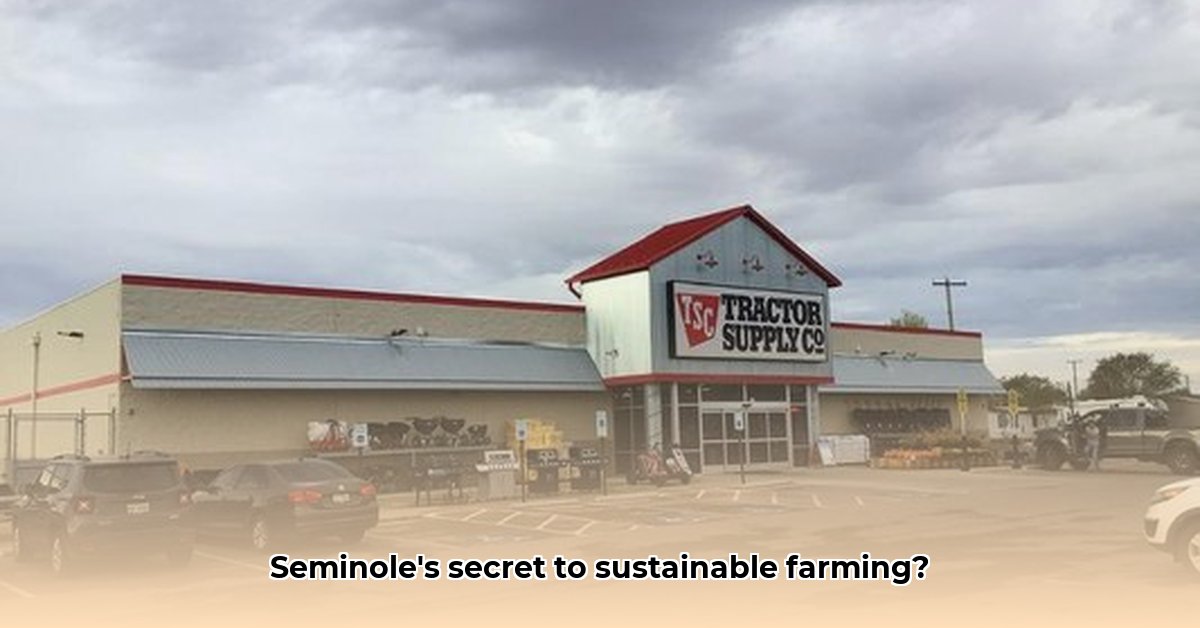
Tractor Supply Company (TSC) plays a significant role in Seminole, Oklahoma's agricultural landscape, but its contribution to sustainable farming practices requires further investigation. For more information on TSC's sustainability efforts, check out this helpful resource. While TSC's presence is undeniable, the extent of its impact on environmentally friendly farming methods remains unclear due to a lack of readily available data. This article analyzes TSC's potential influence, explores stakeholder perspectives, and proposes actionable steps to foster sustainable agriculture in Seminole.
Tractor Supply's Current Role: A Detailed Look
TSC serves as a central hub for many Seminole farmers, providing essential tools, supplies, and resources ranging from seeds and fertilizers to equipment and animal feed. However, the degree to which these offerings support sustainable agriculture is uncertain. The current data is insufficient to determine whether TSC prioritizes organic seeds and sustainable equipment, or focuses primarily on conventional products. This lack of transparency hinders any comprehensive evaluation of their impact. How can we effectively assess their role without a clear inventory of their products and their environmental impact?
Understanding Sustainable Farming Practices
Sustainable farming encompasses responsible food production practices that minimize environmental impact. This includes efficient water usage, reduced reliance on harmful chemicals, utilization of renewable energy sources, and overall environmental stewardship. TSC could be a significant driver of sustainable practices, but also potentially a contributor to unsustainable ones. We need to fully explore both possibilities.
The Critical Need for Data and Transparency
The primary challenge lies in the scarcity of accessible information. We lack detailed inventory data regarding TSC's sales in Seminole. What percentage of their offerings are organic or sustainably sourced? Where do their products originate, and what efforts are they making to reduce environmental footprint across their supply chain? This information gap significantly impacts our ability to accurately assess their contribution to sustainable agriculture.
Stakeholder Perspectives and Their Interconnected Goals
Several key stakeholders influence sustainable agriculture in Seminole:
- Farmers: Require affordable, eco-friendly supplies and methods to ensure both profitability and environmental responsibility.
- Tractor Supply: Aims for profitability while needing to demonstrate a demonstrable commitment to sustainability through concrete actions and data-driven results.
- Government Agencies (e.g., Oklahoma Department of Agriculture): Concerned with environmental protection and food security, requiring transparency and measurable outcomes from all stakeholders.
- Researchers and NGOs: Provide vital data, analysis, and support for sustainable agriculture, as well as conducting research to assess environmental impact and guide policy.
A lack of collaboration among these stakeholders significantly hampers progress toward sustainable farming practices.
Actionable Steps for a Sustainable Agricultural Future
To foster sustainable agriculture in Seminole, we propose these actionable steps:
Tractor Supply: Publish detailed, verifiable annual reports, including quantifiable metrics on their progress towards sustainable practices, and increase transparency around their supply chain. Implement educational programs for farmers on sustainable farming techniques. Partner with local organizations promoting sustainable practices.
Farmers: Actively seek information and training on sustainable farming techniques and adopt methods that minimize environmental impact. Advocate for policies supporting sustainable agriculture and communicate their needs to TSC.
Oklahoma Department of Agriculture: Facilitate collaboration between TSC, farmers, and local researchers. Provide financial incentives and technical support for sustainable agricultural practices. Implement mandatory reporting requirements for businesses to ensure transparency and accountability.
Researchers & NGOs: Conduct thorough research to assess the current state of sustainable agriculture in Seminole, analyze TSC's supply chain and product offerings, and engage with the local farming community through surveys and interviews to gather valuable insights.
Risk Assessment and Mitigation Strategies
The transition to sustainable agriculture presents challenges:
| Risk Factor | Likelihood | Impact | Mitigation Strategy |
|---|---|---|---|
| Limited Sustainable Product Availability | Medium | Medium | Advocate for increased availability of eco-friendly products at TSC. Support local businesses offering sustainable options. |
| Lack of TSC Transparency | High | High | Demand more public reporting from TSC on environmental performance, including waste reduction and sustainable sourcing. |
| Unsustainable Supply Chain Practices | High | Very High | Pressure TSC to ensure suppliers adhere to environmentally responsible standards. |
| Insufficient Stakeholder Engagement | Medium | Medium | Promote collaboration between TSC, farmers, and government agencies to raise awareness and encourage sustainable actions. |
The future of sustainable agriculture in Seminole hinges on collaboration, open communication, and a commitment to transparency from all stakeholders. Further research and ongoing monitoring are crucial to ensure continued progress.